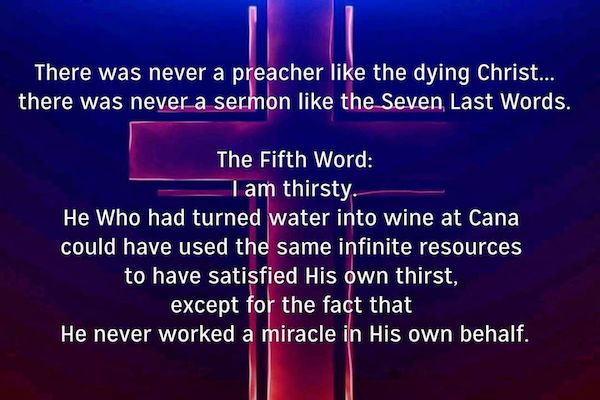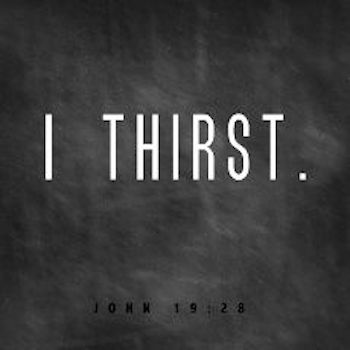LENT 2024: Day 36 - LIFE OF CHRIST

LENT 2024: DAY 36 - Tuesday March 26
“Our Lord spoke seven times from the Cross; these are called His Seven Last Words. In the Scriptures the dying words of only three others were recorded: Israel, Moses, and Stephen. The reason perhaps is that no others are found so significant and representative as these three. Israel was the first of the Israelites; Moses, the first of the legal dispensation; Stephen, the first Christian martyr. The dying words of each began something sublime in the history of God’s dealings with men.
In His goodness, Our Blessed Lord left His thoughts on dying, for He – more than Israel, more than Moses, more than Stephen – was representative of all humanity. In this sublime hour He called all His children to the pulpit of the Cross, and every word He said to them was set down for the purpose of an eternal publication and an undying consolation. There was never a preacher like the dying Christ; there was never a congregation like that which gathered about the pulpit of the Cross; there was never a sermon like the Seven Last Words.
The Fifth Word:
There now came a point in the discourse of the Seven Last Words from the Cross which would seem to indicate that Our Blessed Lord was speaking of Himself, whereas in some of the previous words He was speaking to others.
But the facts are not quite so simple, It is, indeed true that the loss of blood through the sufferings, the unnatural position of the Body with the extreme tension on hands and feet, the overstretched muscles, the wounds exposed to air, the headache from the crowning of thorns, the swelling of the blood vessels, the increasing inflammation – all would have produced a physical thirst. It was not surprising that He thirsted; what was surprising was that He said so. He Who threw stars into their orbits and spheres into space, he Who shut up the sea with doors, He Who made water come out of the rock smitten by Moses, He Who had made all the seas and rivers and fountains, He Who said to the woman of Samaria: “The man who drinks the water I give him will not know thirst any more”, now let fall from His lips the shortest of the seven cries from the Cross:
“I am thirsty.”
(John 19:28)

When He was crucified He refused to take a concoction which was offered Him; now He avidly asked for a drink. But there was considerable difference between the two drinks; the first was myrrh and was a stupefying potion to ward off pain; that he refused, in order that His sense might not be dulled. The drink that was now given to Him was vinegar or the sour bad wine of the soldiers. “There was a jar there full of vinegar; so they filled a sponge with the vinegar and put it on a stick of hyssop, and brought it close to His mouth. Jesus drank the vinegar.” (John 19:29)
He Who had turned water into wine at Cana could have used the same infinite resources to have satisfied His own thirst, except for the fact that he never worked a miracle in His own behalf. But why did He ask for a drink? It was not solely because of the need, great though that must have been. The real reason for the request was the fulfillment of the prophecies: “And now Jesus knew well that all was achieved which the scripture demanded for its accomplishment; and He said, ‘I am thirsty.’” (John 19:28) All that the Old Testament had foretold of Him had to be fulfilled to the smallest iota… Thus the soldiers, though they gave Him the vinegar in mockery, for so it is explicitly stated, nevertheless fulfilled the Scriptures.
He would not give up His life until He had fulfilled details of the Scriptures that men might know that it was He, the Christ, the Son of God, Who was dying on the Cross. He was taking out of the Scripture the idea that the Messias of the promise must not accept death as a fate, but perform it as a deed. Exhaustion was not to put Him to death, as exhaustion accounted not for His thirst. As High Priest and Mediator it was the prophecies concerning Him that prompted the cry of thirst… The bystanders at the Cross who knew well the Old Testament prophecies were thus given another proof that he was the suffering Messias.”
(Chapter 49, pgs. 806 – 811)
+ QUOTES FOR LIFE